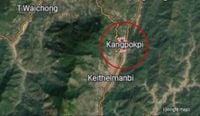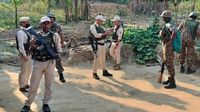Imphal: The Superintendent of Police for Kangpokpi district in Manipur has issued a stern warning to all personnel, stating that strict disciplinary action will be taken against any uniformed officer found attending a meeting called by the Kangchup Area Protection and Development Committee (KAPDC), which the police have labeled a “fictitious organisation.” In a notification released on April 21, 2025, the SP noted that the department had learned through social media that the KAPDC, allegedly under the aegis of the Kuki Inpi, South West Sadar Hills, had called for a meeting on April 30 at K. Ponlen Village.
The meeting reportedly targets serving personnel from the Civil Police, Manipur Rifles (MR), and Indian Reserve Battalion (IRB) belonging to Kuki villages in the Kangchup area. The SP emphasized that the announcement made by the KAPDC is illegal, warning that any uniformed personnel attending the meeting would be considered to have committed gross service misconduct. “Strict disciplinary action will be initiated,” the notification stated.
Meanwhile, a separate notification dated April 18, 2025, issued by the KAPDC was widely circulated on social media. Jointly signed by the committee’s secretary, Minlen Lhouvum, and chairman, Sasat Kipgen, the message summoned all Kuki chiefs and police personnel to attend the April 30 meeting. A translated excerpt from the circulated notice read, “This notice is addressed to the Kuki chiefs of Kangchup and to Kuki personnel serving in the Manipur Rifles (MR), Indian Reserve Battalion (IRB), and the State Police. On April 30, 2025, all Kuki chiefs are required to send individuals serving in the State Police to the KAPDC office in K. Ponlen.”
The KAPDC's notice further stated, “This meeting has been arranged following detailed discussion with the Kuki militant groups… Therefore, if you love your land, we kindly request our village chiefs and police personnel to attend the meeting without fail.” However, in a clarification issued on April 21, the KAPDC’s secretary (information) distanced the organisation from a Thadou-Kuki dialect statement circulating online. The clarification asserted that the message directing village chiefs to send Kuki police personnel to Kangchup was “entirely baseless.”
Additionally, the KAPDC denied the claim that the call for the meeting was made “with the knowledge of the Samsao (SoO) group,” labeling it “completely false.” The group alleged that the statement was “a calculated attempt to damage the reputation of the Kuki community, particularly the SoO leadership.”
Concerns regarding the law and order situation in the state have been raised, with the Meitei Heritage Society stating that summoning police personnel for such a meeting was a “mockery of India and democracy.”
The Kangpokpi district police reiterated their stance, emphasizing the need for compliance among personnel to avoid any disciplinary actions. The warning highlights the ongoing tensions in the region, particularly between different ethnic groups and the police force.
The KAPDC, which claims to represent the interests of the Kuki community, faces scrutiny as it attempts to assert its influence amid allegations of illegitimacy. The juxtaposition between the KAPDC's call for unity and the police's strict warnings illustrates the complex dynamics at play in Manipur, where ethnic identities and political affiliations often intersect.
As the April 30 meeting approaches, the situation remains tense, with both sides standing firm in their positions. The Kangpokpi district police are prepared to enforce their directive, while the KAPDC continues to rally support among the Kuki community, insisting on their right to gather and discuss issues affecting their people.
This incident underscores the ongoing struggles in Manipur, where local governance, ethnic identity, and law enforcement often collide, raising questions about the balance of power and the role of community organizations in the political landscape.
With the backdrop of rising tensions, the outcome of the planned meeting and the police's response may have significant implications for the Kuki community and the broader societal fabric of Manipur.
As both sides prepare for potential confrontations, the eyes of the local populace and observers alike will be on Kangpokpi, where the interplay of authority and community continues to evolve.
In light of these developments, the situation in Kangpokpi serves as a reminder of the complexities surrounding community engagement and law enforcement in a region marked by diverse ethnic identities and historical grievances.









